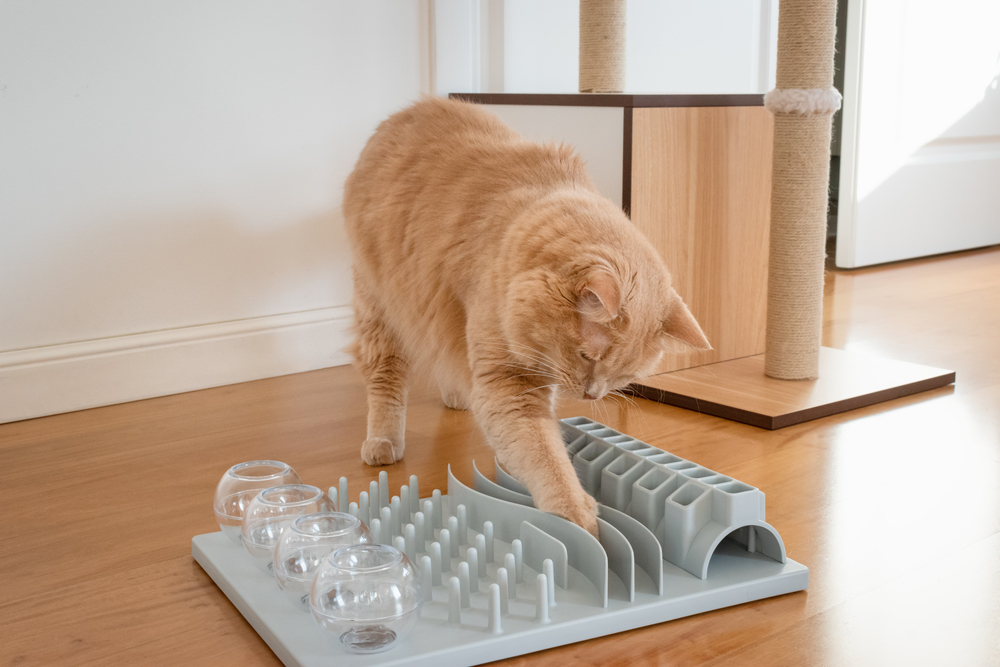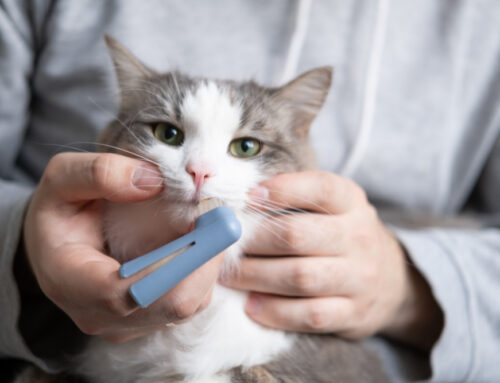If your senior pet appears confused and disoriented in familiar settings and has seemingly forgotten their house-training, their signs could be more than a result of normal aging. While some behavioral and cognitive changes are to be expected as a pet ages, cognitive dysfunction syndrome (CDS), similar to a human’s dementia or Alzheimer’s disease, is a serious condition that can negatively impact your furry pal’s quality of life. Our Cane Bay Veterinary Clinic team answers frequently asked questions (FAQs) about how to identify and manage pets’ cognitive dysfunction.
Question: What is cognitive dysfunction syndrome?
Answer: CDS is a neurobehavioral condition that geriatric dogs and cats can develop. Age-related oxidative brain damage causes a pet’s cognitive functioning to deteriorate. In pets who have CDS, the abnormal protein beta amyloid builds up in their brains, decreasing the organ’s nerve signaling ability. Similar to humans’ Alzheimer’s disease, CDS degrades a pet’s memory, understanding, learning ability, and awareness. No test is available to diagnose CDS definitively. The disease can only be confirmed after death. However, veterinary researchers believe CDS affects a majority of senior and geriatric pets:
- Of 11- to 12-year-old dogs, 28% develop the disease.
- Of 15- to 16-year-old dogs, 68% develop the disease.
- Of 11- to 21-year-old cats, 36% develop the disease.
Q: What are cognitive dysfunction syndrome signs in pets?
A: Veterinary professionals use the acronym DISHAAL to help pet owners remember this disease’s signs. Pets’ CDS signs include:
- Disorientation — If your pet seems confused in familiar surroundings, frequently appears lost or aimless, has difficulty finding their food or water bowl, or struggles to navigate through doorways, they might be disoriented, which is a common CDS sign.
- Interactions — Social behavior changes can also indicate CDS. Your four-legged friend might interact less with family members, show indifference to play, or even become unusually irritable.
- Sleep-wake cycle changes — Shifts in your pet’s sleep-wake cycle is another indication that they have CDS. Your furry pal may become restless at night, sleep more during the day, or have difficulty settling down to sleep.
- House soiling — If your pet suddenly forgets their house-training and starts having accidents indoors despite having access to the outdoors or a litter box, they may have CDS.
- Activity level changes — Activity level changes can also indicate CDS. Your four-legged friend might show less interest in activities they once enjoyed, or they might exhibit repetitive behaviors such as pacing.
- Anxiety — Your pet might become increasingly anxious, becoming clingy or nervous.
- Learning or memory changes — Pets may struggle with remembering trained behaviors and may find learning new ones difficult.
Q: How is cognitive dysfunction syndrome diagnosed in pets?
A: No specific CDS test is available, and our Cane Bay Veterinary Clinic team can only diagnose the condition after ruling out other potential causes. After you provide us with your pet’s detailed behavioral history and describe the changes your furry pal has exhibited, we will perform a thorough physical examination to evaluate their overall health status and cognitive functions. Our team may recommend diagnostic tests, such as blood tests, thyroid testing, ultrasounds, and X-rays, to rule out whether your four-legged friend has an underlying health condition that may cause behavioral changes similar to those exhibited with CDS. Only after eliminating other potential diagnoses will our team be able to diagnose your pet with cognitive dysfunction.
Q: How can I support my pet with CDS?

A: While CDS is incurable, an early diagnosis can significantly help manage the condition and slow the progression. To improve your pet’s quality of life and overall functioning, our Cane Bay Veterinary Clinic team may recommend the following medical treatments:
- A prescription diet rich in antioxidants and fatty acids
- Anti-anxiety medications
- Supplements, including S-adenosyl-L-methionine (SAM-e), melatonin, or B vitamins
In addition to our team’s treatments, your furry pal with CDS can benefit from helpful disease management strategies you follow at home. To support your pet’s cognitive functions and keep them comfortable and active, follow these at-home tips:
- Maintain a consistent routine — Consistency can be incredibly helpful for a pet with CDS. Keeping a regular schedule for feeding, exercise, and bedtime can provide a sense of security and help reduce confusion. If you need to introduce changes, do so gradually to avoid causing unnecessary stress.
- Provide enrichment — A pet with CDS needs regular mental and physical enrichment to remain sharp. Provide your four-legged friend with physical and mental enrichment by doing the following:
- Exercising with them daily
- Interacting with them as often as possible
- Providing them with engaging toys
- Teaching them new commands and tricks or practicing ones they have forgotten
- Modify your pet’s environment — Make your home accessible and safe for your furry pal, helping them navigate their environment and feel more secure. To support your pet who has CDS, provide these:
- Night-lights to help your senior pet navigate in the dark
- Potty pads near doors to give your pet a place to go if they can’t make it outside in time
- An orthopedic bed for added comfort
If you’re concerned about your senior pet’s cognitive functioning, schedule an appointment with our Cane Bay Veterinary Clinic team. We will evaluate your four-legged friend’s neurologic health and discuss treatment options.







Leave A Comment